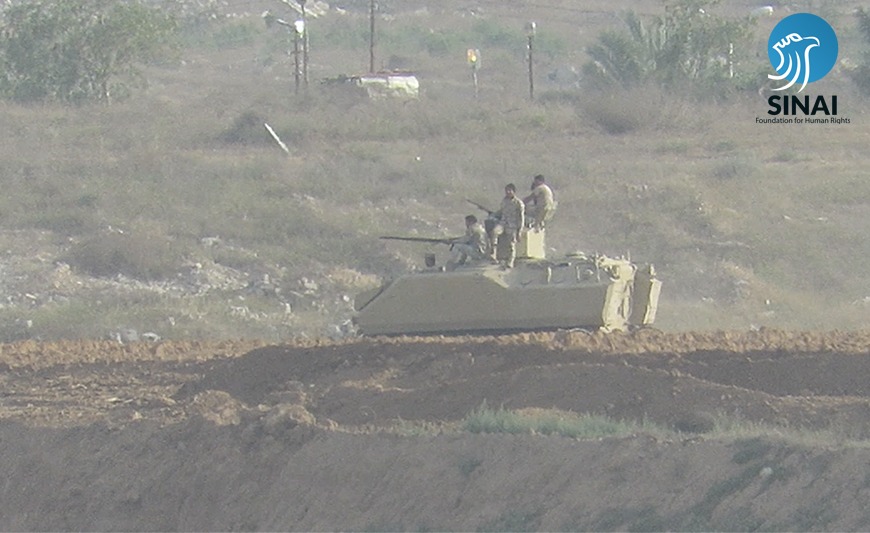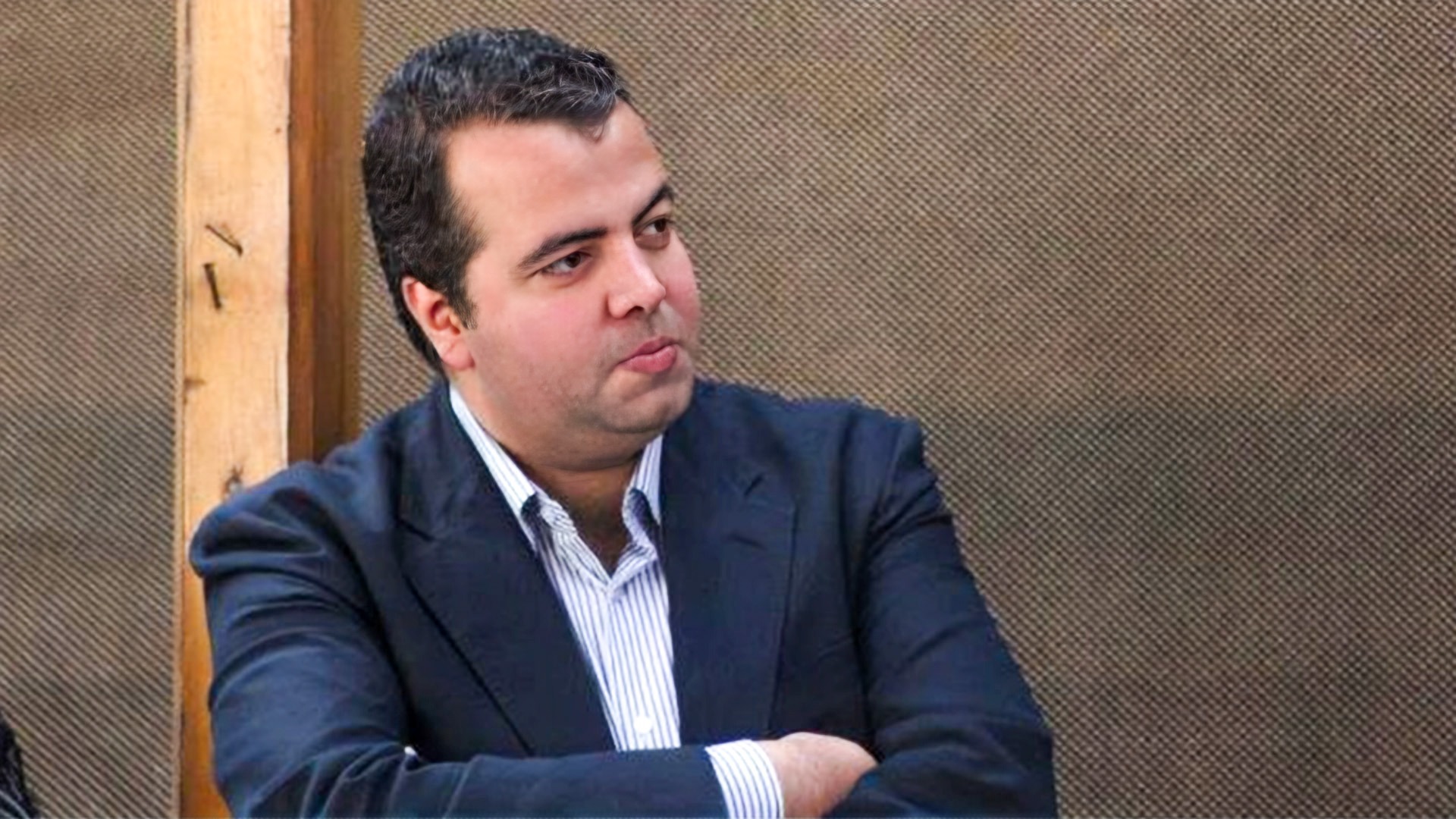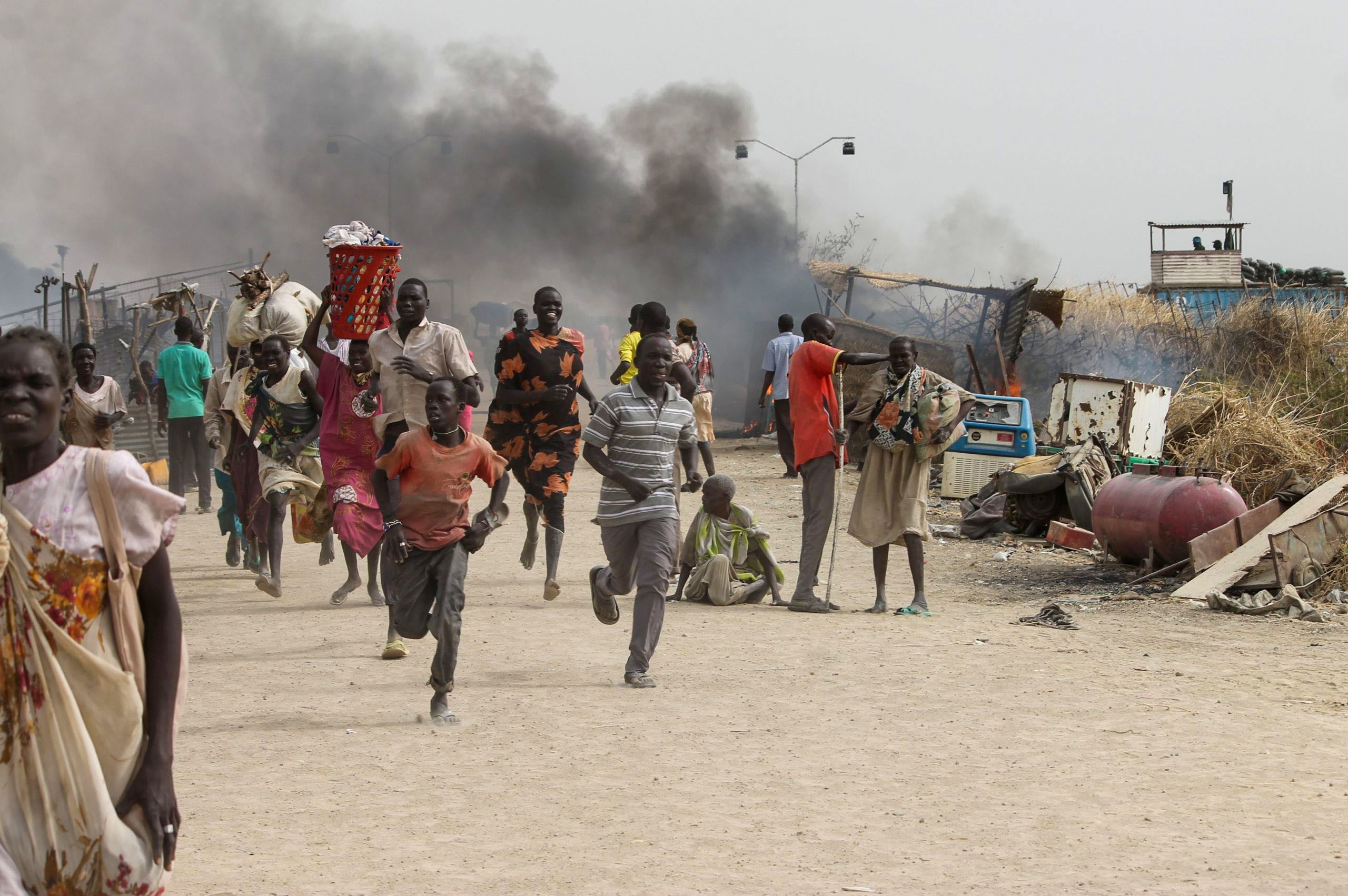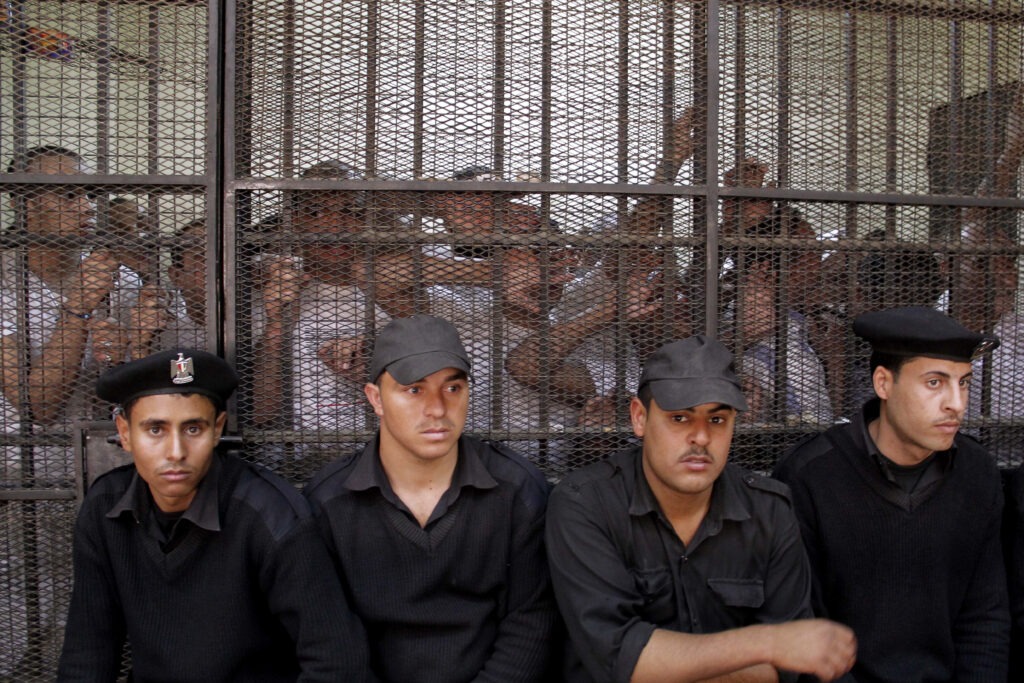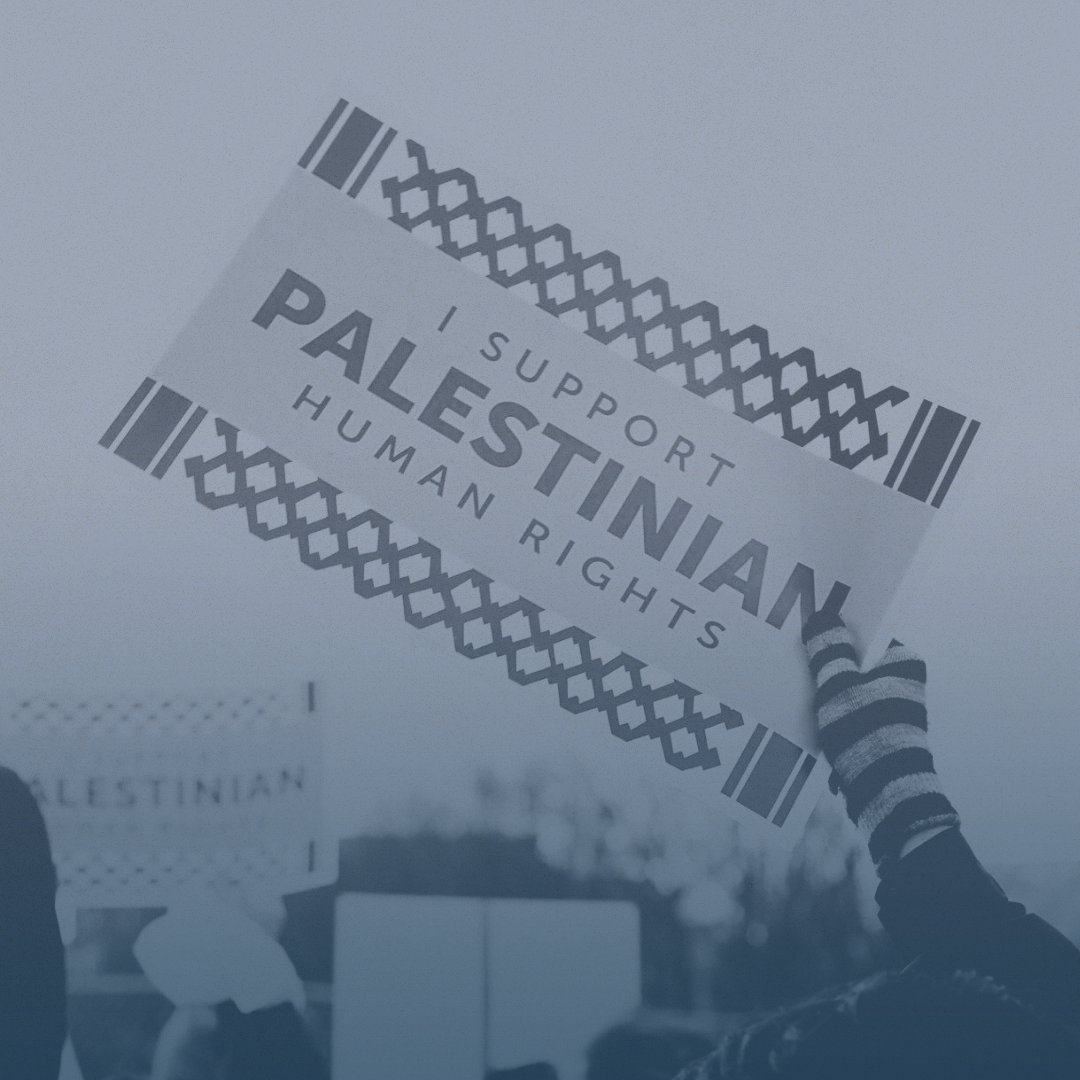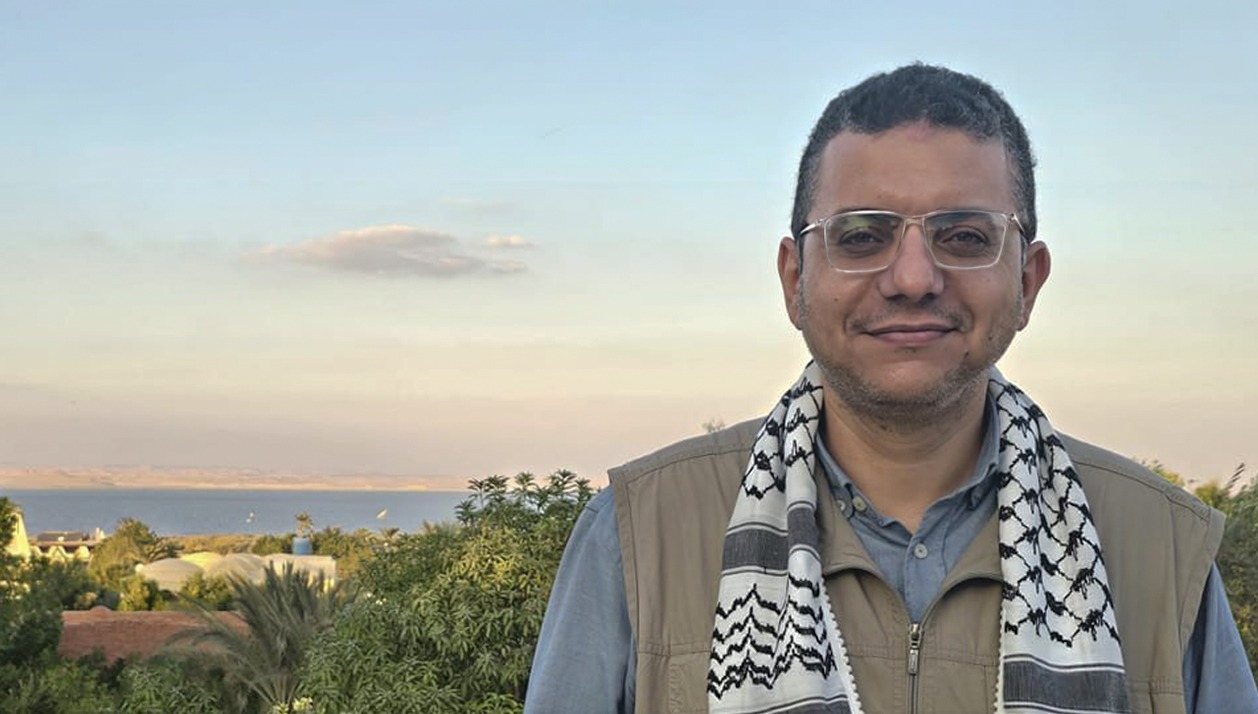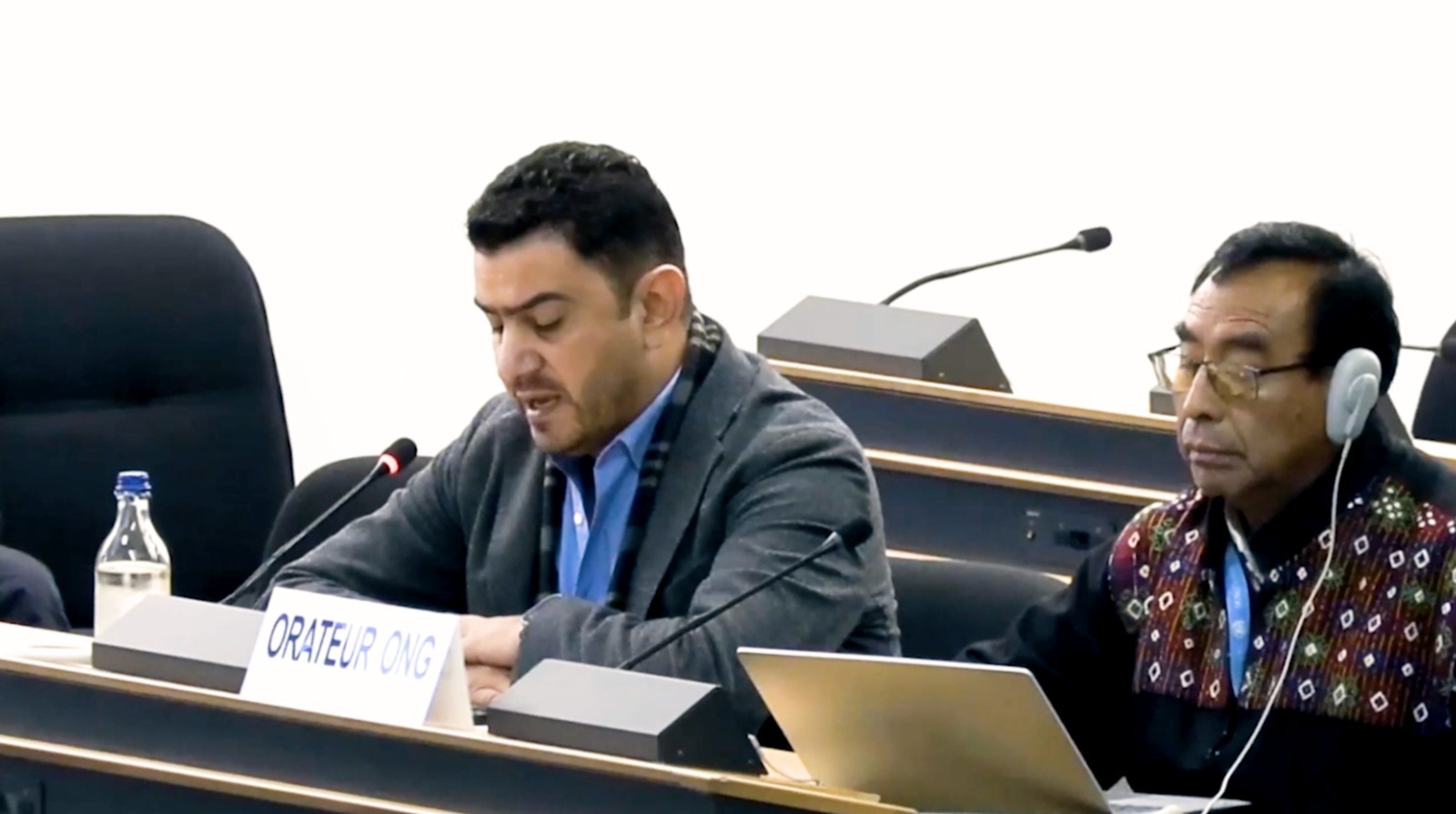“Life here is no different from death. Gunshots and bombings happen out of the blue. For them everything is a military secret that no one should see or even speak of. We all want city reconstruction or development, but not development based on the destruction of people’s houses.”
*An al-Arish local speaking about the surprise removal campaign that will reach his house, with the claim of the construction of traffic bridges.
Summary:
The Sinai Foundation for Human Rights has recorded 4 abuses during February and conducted interviews with 9 eyewitnesses, abuse victims, and a government employee.
This month was the third anniversary of the strict restrictions imposed by the authorities on North Sinai governorate as part of a military counter-terrorist campaign called “Comprehensive Operation – Sinai 2018”, which has made daily life in Sinai unnatural and prison-like, as all areas of life have been restricted, monitored, and subject to security considerations.
During the first week of February, the Sinai Foundation recorded a horrific crime committed by ISIS against a boy no older than 16 years of age, where members of the group abducted the boy, slaughtered him, then threw his body near a poultry farm in al-Shallaq village in al-Sheikh Zwayed, with the claim that he was in cooperation with the security forces.
On the other hand, the Sinai Foundation team has followed the opposition of the people of al-Arish of the expected removal campaigns of their houses and properties with the claim of building new traffic hubs without consulting the people or conducting any community discussions. They also recorded two incidents in al-Sheikh Zwayed, the first of which was the murder of an Al-Azhar Institute employee by gunfire coming from a military column, where the man took his last breath surrounded by his wife and children. The foundation team also recorded the injury of a teacher by shrapnel resulting from a shell hitting while he was inside the school.
Details of the abuses:
Egyptian authorities and law enforcement forces abuses
-
The continued stifling restrictions imposed on civilians since 09.02.2018
The third anniversary of the strict restrictions imposed by the Egyptian authorities on North Sinai on 09.02.2018 as part of a broad military counter-terrorism campaign called “Comprehensive Operation – Sinai 2018”.
During that time, the restrictions that affected the 450 thousand citizens of the governorate included the prohibition of bringing goods and food supplies into North Sinai, the prohibition of traveling from and to the governorate, complete lockdown of the entire governorate, restricting the acquisition of fuel and gasoline, and the prohibition of fishing.
Some of those security restrictions still apply to this day, including the total prohibition of fishing in the sea in a discriminatory resolution against the people of Sinai, allowing the acquisition of a limited amount of fuel and gasoline for vehicles, which is 30 liters every two weeks, and only from 3 gas stations in al-Arish and one station in Bir al-Abd, in addition to subjecting goods to security procedures before they enter the governorate, and while transporting them from one city to another, and the complete prohibition of certain goods and products, especially those used in electricity, construction, and agricultural pesticides, claiming that they could have double uses.
These restrictions are a group punishment for the locals that led to the obstruction of their daily lives and the isolating of cities from each other. Despite the government’s stifling restrictions, they failed to stop the attacks and abuses carried out by ISIS, and instead created a gap between civilians and official authorities.
The Sinai Foundation for Human Rights has met with two North Sinai locals who recalled extremely hard times they had been through. One of them, who had moved from Rafah to al-Arish where most villages were evacuated said:
“I swear that my wife, my kids, and I couldn’t find anything to eat other than tree leaves. My wife would go with some of the women to the ambush in al-Masoura village in Rafah to beg the soldiers for food. Some soldiers were kind and gave them canned food, which was not enough to feed a family. One of those days, I wished I would get sick or injured, because it is the only way to get out of Rafah to go to al-Arish hospital. I was planning on cutting myself with a knife or something sharp to have a reason to be moved in an ambulance. I thought maybe al-Arish is better than here. Then two days after my plan, god wills it that my wife gets hit by a stray bullet and gets transported to al-Arish. My kids and I went with her in the ambulance, and we stayed in the hospital, which was a little better than living in Rafah.”
The second witness from southern Rafah said with tears in his eyes: “I literally ate orange tree leaves, as there wasn’t any other option. The flour and lintel and everything else had run out, and I couldn’t get myself to go to other people’s houses asking for food when I knew their situations weren’t better than mine, so I would just eat leaves when there were no more oranges on the tree.”
The two witness statements show that the restrictions imposed on movement and the transportation of enough food supplies to reach people turned the area into a place where life necessities were absent, and demolished the right to food, which violates several rights and obligations specified in the United Nations standards, which obligate the Egyptian government to provide food and facilitate the acquisition of enough portions of it.
2- Sudden evictions and removals in al-Arish leading civilians to face an uncertain future
Once the government authorities were done with evicting close to 4500 of Abou-Saqal neighborhood families in al-Arish in order to develop the Port of Al-Arish, citizens of the city were met with a second slap to the face when they discovered a plan to build 3 traffic hubs, which requires the removal of more houses and private properties in the path of those hubs. Those hubs have become the cause for concern for the people of al-Arish because they were never consulted or even informed of said hubs, despite the existence of official statements confirming community discussion sessions regarding the house-removal campaigns.
On 28 January of this year, the Sinai Foundation for Human Rights has issued a press release where they mentioned the details of the project of evacuation of the Port of al-Arish area, which includes an impending eviction of thousands of families from the area with the claim of “developing” it, without consulting or talking to the people of that area, and without offering them any real alternatives appropriate to their losses. This removal campaign reinforces the reality of a well-thought-out evacuation planned by the Egyptian government over the course of many years.
The Sinai Foundation for Human Rights has interviewed 3 people potentially affected by the sudden removal campaign with the claim of building new traffic hubs. The first, who lives in house near the sea road, said:
“We were surprised by young men who seem to be engineers carrying measurement equipment and walking around the street taking measurements and writing down numbers in red on sidewalks and houses. When we asked what they were doing, they said that the roads are being developed and expanded. They said they were measuring areas and sending the data to the engineering authority, as they are the ones in charge. After talking to the engineers, people we know in the municipal council told us that some houses on the side of the road would be removed for the expansion, and that we are supposed to be compensated. The truth is, I don’t trust what the government says, especially because I know many of people from al-Sheikh Zwayed and Rafah who did not receive any compensation, even years after their eviction.”
The next witness who lives in the al-Saha al-Shabia area said: “They put numbers in red on houses in our street. Then we knew for sure after the governor’s speech on the radio that a road will be constructed, running from the security directorate, passing through al-Saha al-Shabia, al-Atlawy square, and connecting to Assuit street. Can you imagine the number of houses in that area? It is basically half of al-Arish. They suddenly decide to build a road, then say they will compensate us. No one knows how much the compensation will be. Maybe they want to surprise us again with very little money as compensation like they surprised us with the construction of the road.”
A man living in al-Saha al-Shabia told the foundation team: “Life here is no different from death. Gunshots and bombings happen out of the blue. For them everything is a military secret that no one should see or even speak of. We all want city reconstruction or development, but not development based on the destruction of people’s houses. We can see the lives of the people of Rafah who moved to al-Arish when they were kicked out of their houses and told they would be compensated. They have been trying to get their compensation for five years, and their lives are hell.”
The Sinai Foundation team walked through the streets of the area visited by the government’s survey team and noticed numbers written in red on sidewalks, which points to the commencement of the exclusion of the development, without waiting for the results of the community discussions recommended by the presidential commission before the execution of any construction in residential areas.
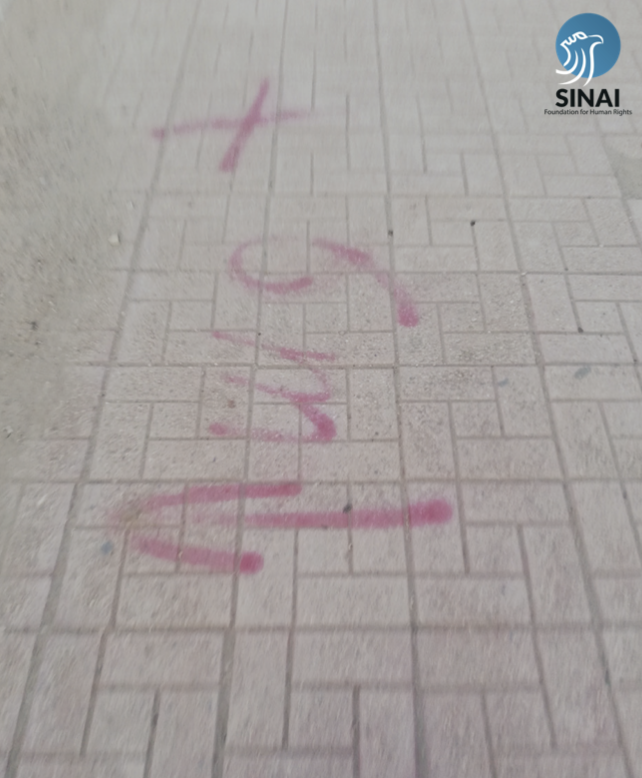
The affected locals’ conversations have turned into family meetings attended by those who own houses in the area of the hubs that are to be expanded and announced their refusal of the plan. They agreed to form a committee of 10 people to meet the governor of North Sinai and present him with their refusal of the removal plan for the development, then to higher authorities in case of no positive response from the governor, stressing on their rejection of compensations and their stern request for alternatives to the removal of houses and properties.
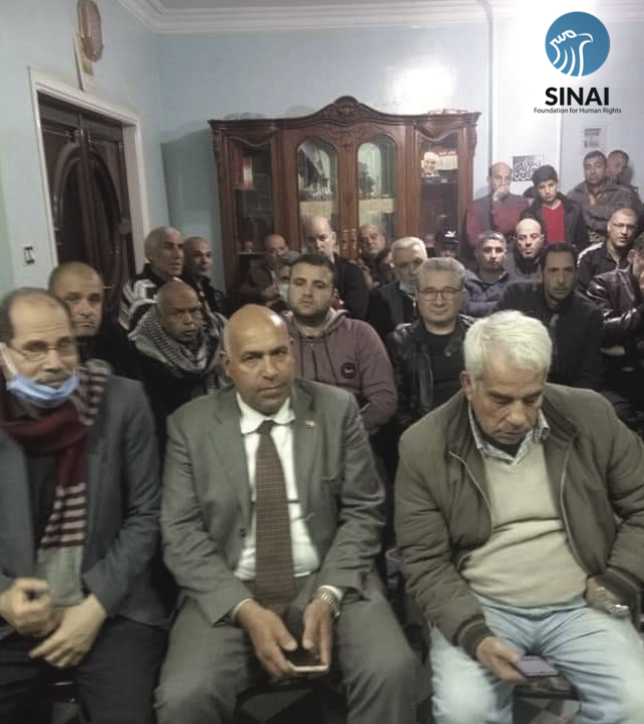
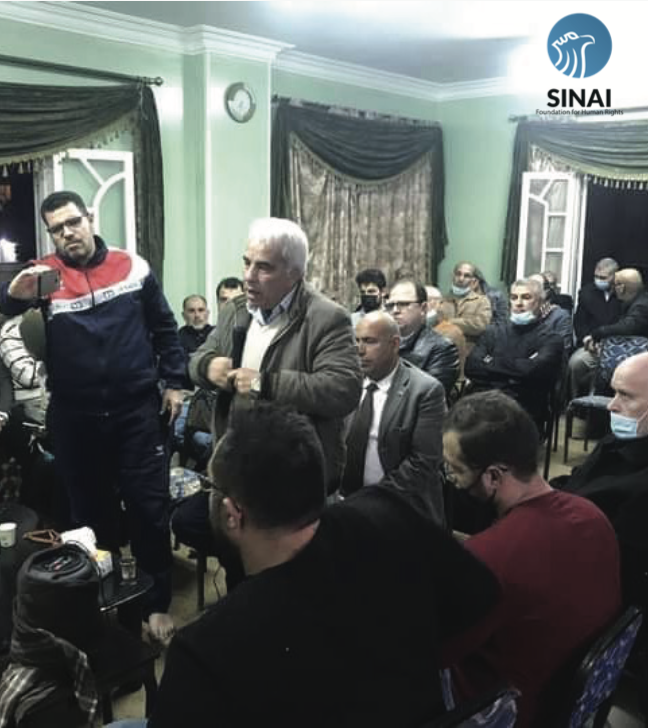
On the other hand, North Sinai radio transmitted a recorded speech by the governor where he seemed to be completely with the government’s plan to build new traffic hubs and compensate the locals, but he said that the decision was the president’s responsibility, saying that the armed forces engineering authority is the one that came up with that plan, and the one that decided which houses to be removed for the execution of the project, and that the governor and governorate officials have no hand in any decision. Activists from al-Arish tried to get the hashtag “#Nototheremovals” to trend to extend the circle of popular refusal of the government’s development proposals.
The Sinai Foundation met with an employee in al-Arish working in a government body concerned with the procedures of removal and development campaigns who said: “All government decisions are surprise decisions now, with no prior notification or even real discussion with the locals. These hubs were not in the government’s plan or planned by the governorate’s engineering office. We were recently informed of those plans just like the locals were, and we were not allowed to make other plans for alternative hubs to lessen the damage done to the locals.”
On a parallel approach, parliament member Rahmy Bakir requested a briefing with the speaker of the House of Representatives about different suggestions including building a new city of al-Arish 17 kilometers west to the current city and not changing the landmarks of the current city, as a way of solving the issues.
The Principles of Justice and the International Human Rights Law (applicable in the case of peace) and the International Humanitarian Law (applicable in the case of war) obligate the necessity of preserving civilian properties, including houses, and prohibit their demolition and removal except in specific exceptional cases like ensuring the inhabitants’ safety from environmental dangers or armed groups. The International Law only permits governments to turn to such actions as a last resort in case of no other alternatives, and under strict safeguards that include proportionality, transparency, prior discussions with local citizens, and looking into all other solutions and alternatives. In the case of a compelling circumstances that lead the government to the removal of houses, the government must offer fair compensations in a transparent and rewarding way that remedy the damage done to the civilians and help them find suitable alternative housing. The International Law also states that land cannot be compensated with just money, but also replacement land with the same properties that maintains the locals’ lives, customs, and traditions to the most possible extent.
In similar removal incidents that took place in Sinai, there were no recorded public objections from the locals fearing more restrictions and arrests that they could possibly face, as the life in North Sinai is under strict security control that denies the people their right to object or refuse government procedures. The region has been living in a state of emergency and counter terrorism laws for years that have been stifling the people’s freedom to express their opinions and undermining the rights given to them by the law.
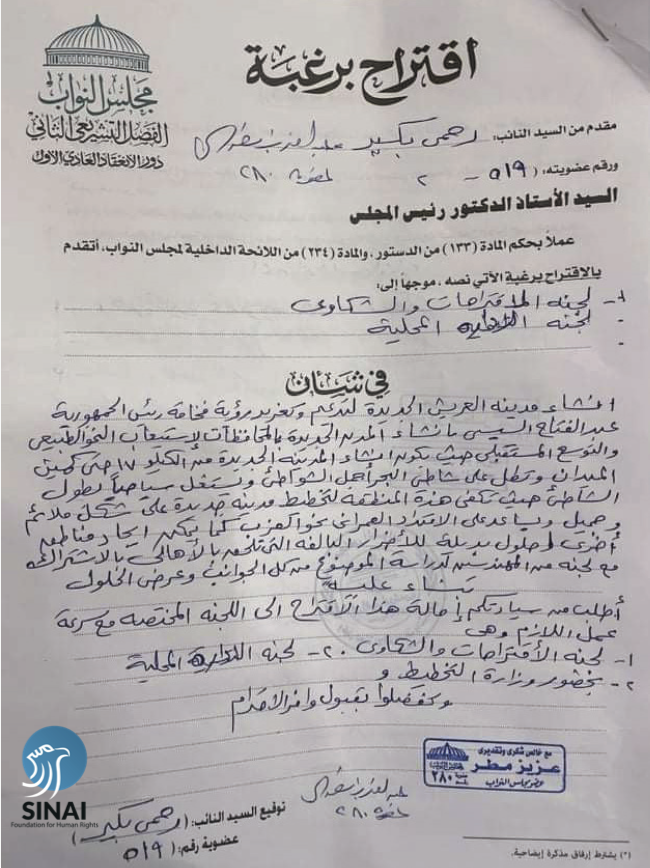
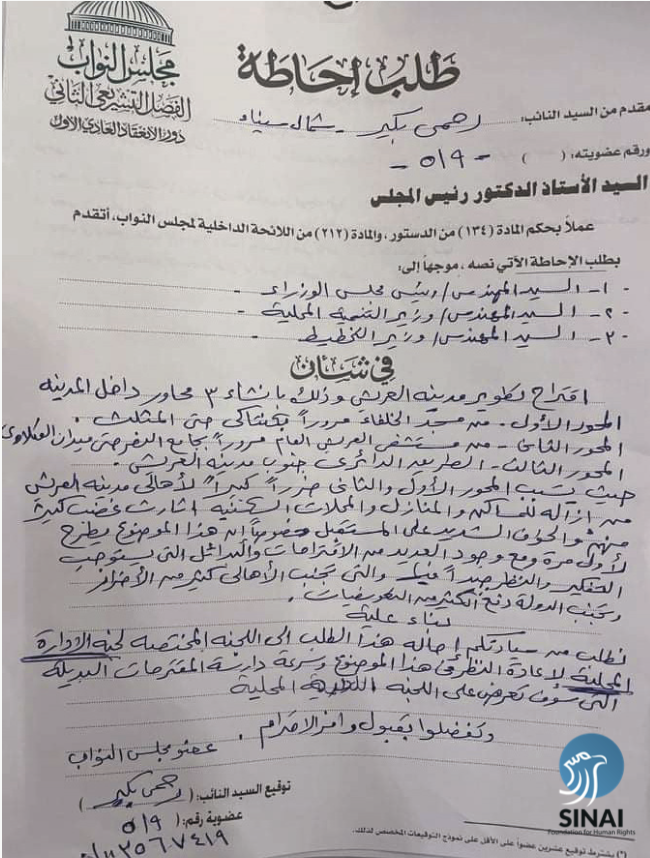
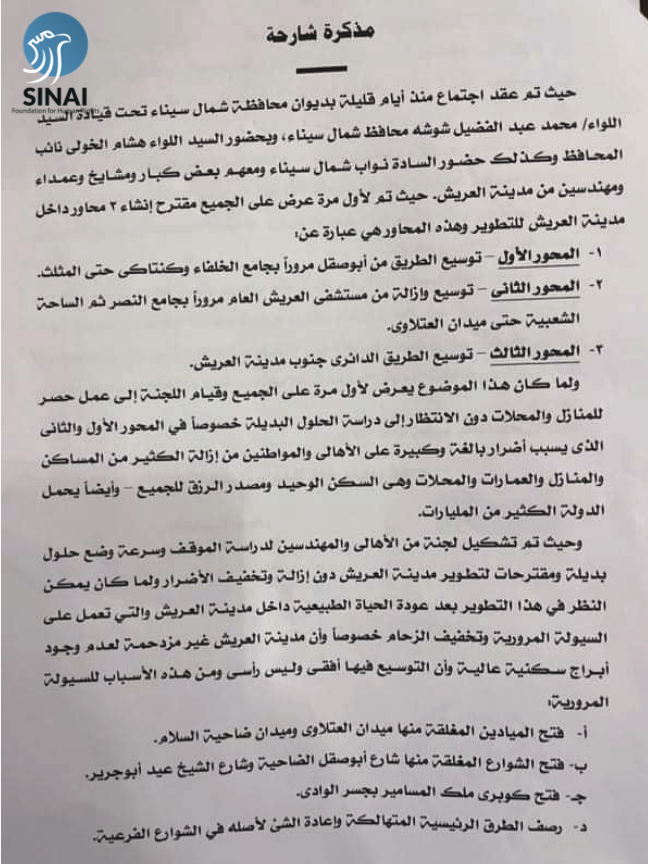
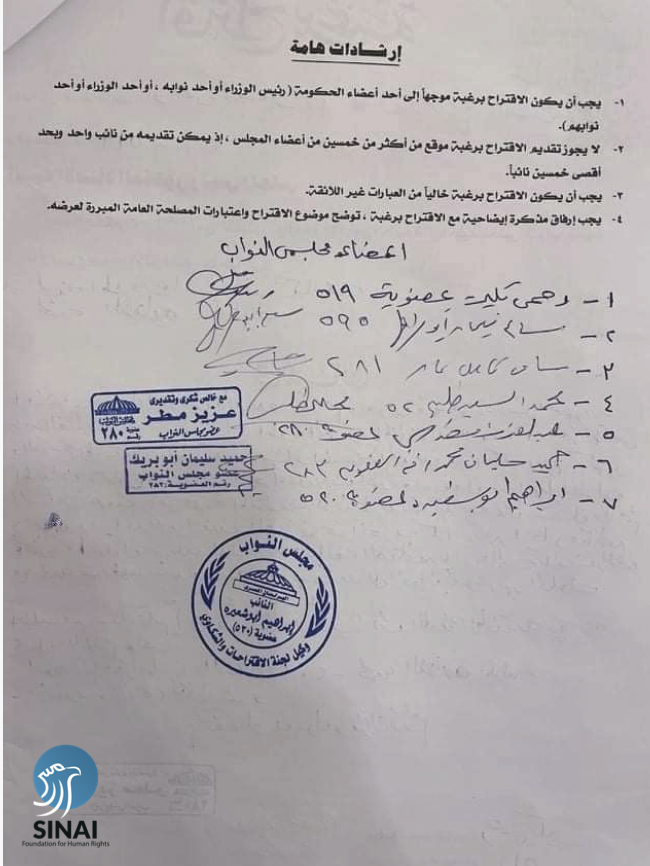
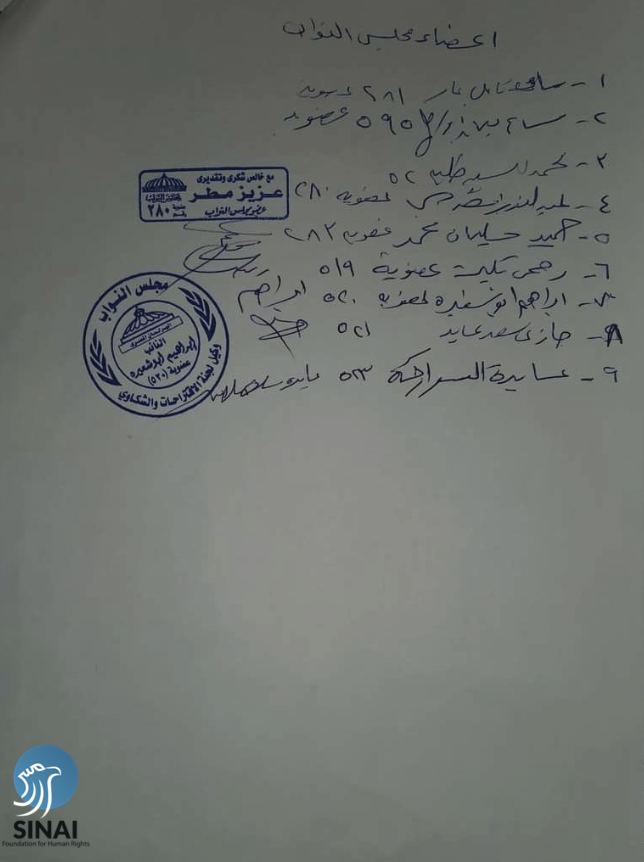
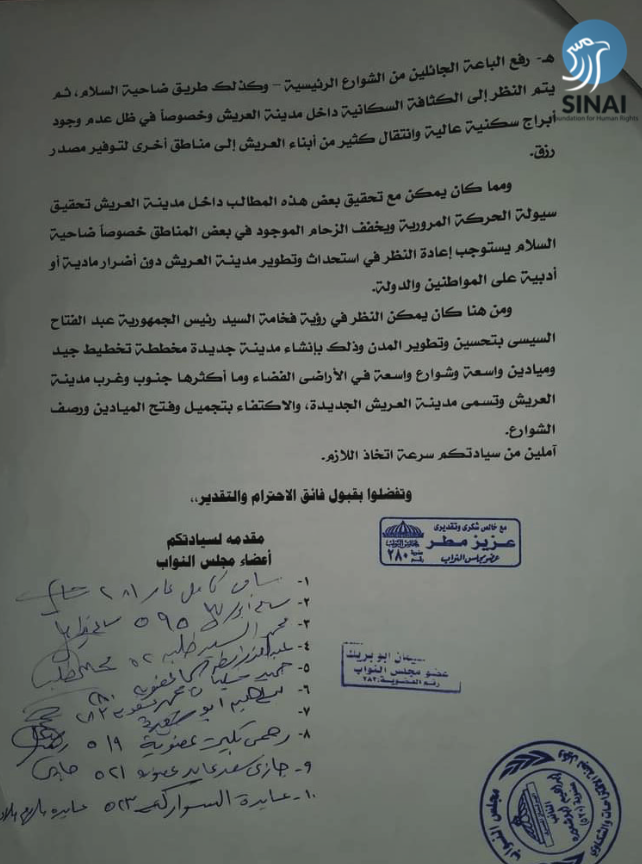
3- Extrajudicial murder in al-Sheikh Zwayed
During the past years following the launch of military operations in Sinai, extrajudicial murder by the conflicting parties has been a recurring crime, and despite that, no trials against the perpetrators have been recorded, which is a flagrant violation of the international instruments and local and international laws binding Egypt. Those instruments include the African Charter on Human Rights, which states in its fourth article that the Right to Life of civilians is to be preserved at all times, including during conflict. The African Commission on Human Rights has also considered that to be a non-derogable fundamental pillar of all rights.
On 25.02.2021, an employee of Al-Azhar Institute in al-Sheikh Zwayed, Ahmed Farhan Suliman al-Hamaida, 35, was murdered by a gunshot that settled in his head while he was driving with his family, the shot came from a security campaign.
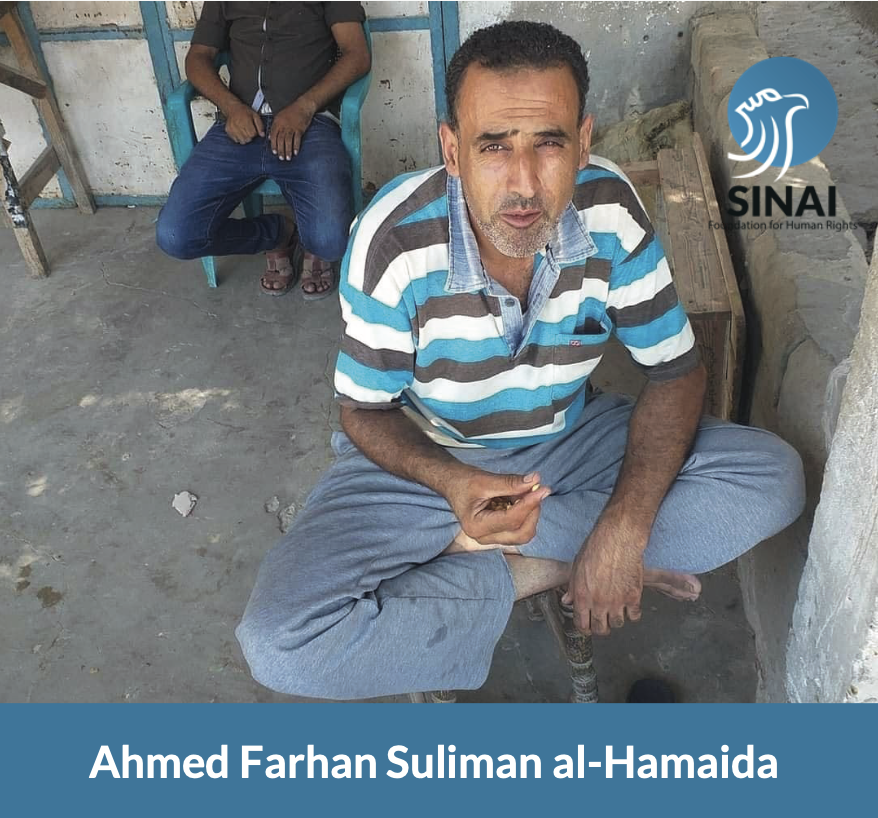
The Sinai Foundation for Human Rights met with a local eyewitness from al-Sheikh Zwayed who said: “The victim was driving a pick-up truck right before noon back toward al-Sheikh Zwayed from al-Arish with his wife and 3 kids. Around 500 meters from al-Kharouba ambush toward al-Arish, a military security campaign was on its way back to al-Sheikh Zwayed. Citizen vehicles were following theirs in something close to a queue because no one is allowed to skip the campaign. The victim tried to get in front of the rest of civilian cars to drive right behind the campaign. The soldier on the armored vehicle in the back of the line fired a shot in the air as warning quickly followed by another shot at the victim’s car. The car stopped, we saw the wife screaming and the children were in a panic. The campaign did not stop. People got out of their cars and found that the driver, Ahmed Farhan, had been shot in the head and had died immediately. They went to the ambush to get the soldiers to get them an ambulance. The ambulance came and took him to al-Arish hospital, then his body was given to his family who buried him in al-Sheikh Zwayed. And of course, there were no accusations.”
An eyewitness statement shows that the victim’s car, even when trying to skip ahead of civilian cars to get closer to the military patrol, posed no threat to them and was not cause for any concern or suspicion. The woman in the front seat and three children in the back negated the existence of any threat that required deadly force to neutralize. In case of suspicion, the car could have been stopped without directly targeting and killing the driver, which means that there was no cause that justified shooting at the driver with intent to kill. This means that this was an extrajudicial murder that requires investigation and accountability by official authorities to give justice to the victims and punish the perpetrator, which does not happen in Sinai. The similar incidents followed by the Sinai Foundation show that impunity is a behavior always practiced by the Egyptian authorities by writing up the incident against persons unknown, which dismisses the existence of a perpetrator.
4- Random indiscriminate shell hitting a civilian in al-Sheikh Zwayed
Article 51, point 4-c of the additional protocol (I) to the Geneva Conventions, 1977, prohibits indiscriminate attacks, which are those which employ a method or means of combat which cannot be directed at a specific military objective, and therefore could hit, in such a case, military targets, civilians, and civilian properties with no distinction.
It is common for indiscriminate shelling and gunfire victims not to get any compensations for damages done to them, as the incidents are recorded as against persons unknown, which denies any legal liability that could be used to get suitable compensation for the damages.
On 28.02.2021, Hussain Salama Salim Riashat, 33, was hit with a shrapnel in his hand while doing his job as a teacher in al-Khansaa preparatory school in al-Zawaraa village in al-Sheikh Zwayed.
The Sinai Foundation met with one of the citizens of the village, who said: “At around 10 in the morning, we heard a loud thud and saw smoke coming from an olive farm owned by one of the people of the village. This farm is about 200 meters away from al-Khansaa preparatory school for girls. We learned that a tank shell coming from the direction of a military checkpoint in al-Goura village had hit the place and exploded. The teachers said that a shrapnel reached the school and hit their colleague Hussain Salama in his hand while he was standing in the school yard with colleagues. He was moved to al-Sheikh Zwayed hospital. The shrapnel broke his hand. Thank god that was all the damage that was done. There were no girls at the school. These days are the days when the girls are going back to school for their exams, which means that that shrapnel could have caused a massacre.”
Indiscriminate gunfire and shelling in North Sinai are considered to be one of the causes for death and injury. They are all written up as against persons unknown in official records, like the case recorded by the Sinai Foundation in al-Kawthar neighborhood in al-Sheikh Zwayed on 01.06.2020.
ISIS-affiliate group, Sinai Province, abuses
Extrajudicial murder in North Sinai
Extrajudicial murder is a gross violation of Human Rights that is recurring in Sinai, and it is an inherent practice by ISIS. Arbitrary deprivation of the right to life is a violation of article 3 of the Universal Declaration of Human Rights, and article 6 of The International Covenant on Civil and Political Rights. The African Charter on Human Rights also stated in article 4 that civilians’ right to life is to be safeguarded at all times, including during conflict, while the African Commission on Human Rights considered it to be a pillar of all rights that is non-derogable.
On 05.02.2021, the Sinai Foundation for Human Rights team recorded a heinous crime in al-Shallaq village in al-Sheikh Zwayed, where the child Ahmed Farrag Suliman Farrag al-Kiky, 16, was murdered with the claim that he was in cooperation with the security authorities, which is a recurring pattern and feeble accusation used by the group to eliminate civilians uninvolved in military operations.
The Sinai Foundation met with a citizen of the village who described the horrifying sight of the boy’s body: “His head was barely attached to his body with a piece of skin.”
He added: “This happened during the night of 5 February 2021, when members of ISIS snuck in and abducted Ahmed. We found him an hour later, slaughtered and thrown by the village’s chicken coop close to the house of the member of the House of Representatives representing North Sinai, Aida al-Sawarka. He was covered in blood and marks caused by maybe a knife. He was taken to a hospital in al-Sheikh Zwayed the next morning, and the people reported the ambush in al-Shallaq, but no one intervened. People carried him and took him from al-Sheikh hospital to al-Arish general hospital then to Port Said to the coroner, so they’d get a burial permit.”
The witness added: “Ahmed was his mother’s only son. He had 3 sisters he took care of. He was the breadwinner of the family. He worked as a guard at the company that is building the new road in al-Shallaq. His father was arrested by the military around 4 years ago and he has not been seen since. No one knows if he is alive or dead. May God bring his mother and sisters peace.”
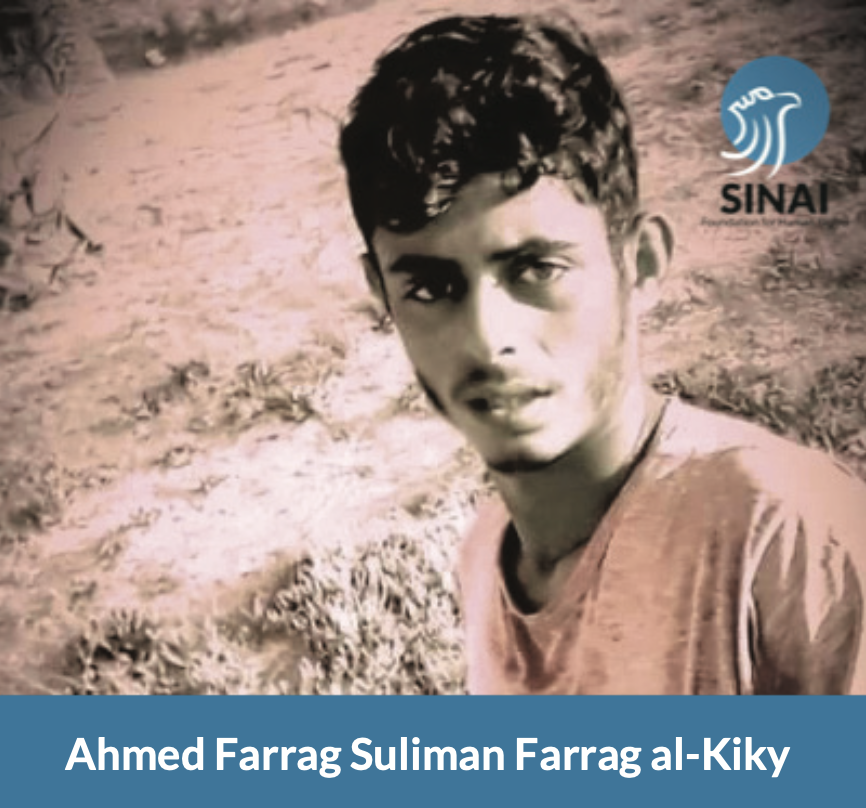
During the past January, the Sinai Foundation has followed ISIS’s announcement in a video recording broadcasted on 09.01.2021 by their media platforms that they murdered two civilians by gunfire, claiming that they cooperated with the security forces. The video included the victims’ confessions - which were most likely taken under pressure and through torture - to cooperating with Egyptian security officers.
Recommendations:
-
To the Egyptian authorities
-
Conducting transparent investigations into the incidents of which members of the military and security forces were part, that led to the fall of civilian victims.
-
Lifting discriminatory and illegal restrictions off business and fishing and movement in Sinai and offering immediate and fair compensations to citizens who were harmed by said restrictions.
-
Complying with principles of the International Humanitarian Law by the military and security forces is an important basis that guarantees professionalism in performing their duties. Officers and military personnel should be taught those rules and trained to abide by them through curricula in the military academy and other training courses.
-
Inviting and accepting visitation requests from UN special procedures mandates to Sinai, and allowing them unhindered access, and guarantying the safety of those who cooperate with them from punishment.
-
Modifying laws and systems that grant unlimited authority to the security and military forces, including the state of emergency and the counterterrorism law, and implementing mechanisms that guarantee judicial and legal supervision on law-enforcement authorities.
-
To all conflicting parties, including Sinai Province militants:
-
Taking all possible precautions to protect civilians, according to the International Humanitarian Law, during any military land or air raids.
-
In areas where the unlawful side of the conflict is the ruling force, all necessary precautions are to be taken to protect the rights of all inhabitants without discrimination and ensure all basic needs of civilians.


